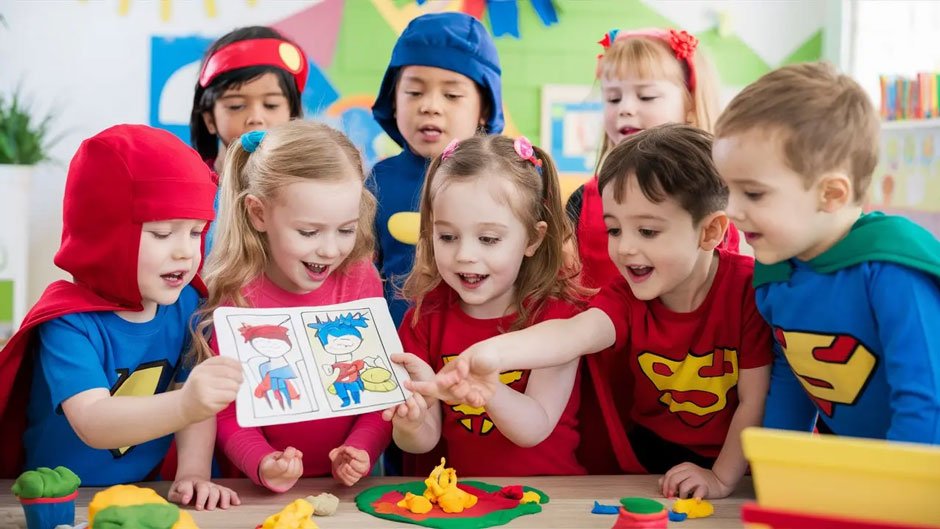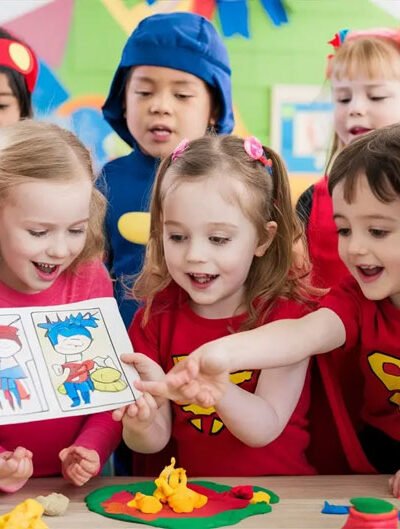 A significant aspect of the preschool experience is social development. While learning letters and numbers is important, it’s equally essential for young children to develop interpersonal skills at this stage. Interacting with peers gives preschoolers the opportunity to make friends, share, and engage socially. These early experiences help shape the foundation for how they will relate to others throughout their lives.
A significant aspect of the preschool experience is social development. While learning letters and numbers is important, it’s equally essential for young children to develop interpersonal skills at this stage. Interacting with peers gives preschoolers the opportunity to make friends, share, and engage socially. These early experiences help shape the foundation for how they will relate to others throughout their lives.
Preschool classrooms are often vibrant, dynamic spaces that bring together children from a wide range of backgrounds. In an international preschool in Singapore, for instance, your child is likely to meet classmates who speak different languages and come from diverse cultures. This rich variety offers valuable learning opportunities, but it can also present social challenges. Your child may need support in building connections, navigating group dynamics, and resolving playground disagreements. As a parent, you play a key role in guiding their social development. Here are some practical ways to help your child thrive socially during the preschool years.
Talk about What to Expect
Before your child steps into their preschool classroom, start by talking to them about what school will be like. Explain that they’ll meet new friends, take turns, follow routines, and play with others. This kind of conversation can ease anxiety and help your child form a clear mental picture of what to expect. If possible, visit the preschool together before the first day—familiarity with the environment can go a long way in making them feel more comfortable.
Another helpful approach is to read books about preschool and friendship. Storytime provides a safe and engaging way for your child to explore their feelings, ask questions, and prepare for new experiences. You can also use stories as a springboard to discuss how they might behave in different social situations.
Practice Social Skills at Home
Social skills can be nurtured long before your child enters a preschool classroom. Everyday routines offer natural opportunities to practice essential behaviors like taking turns, saying “please,” and sharing. For example, playing board games with family members teaches turn-taking, while family meals are great for encouraging conversation and active listening. Even pretend play allows children to explore and act out real-life social scenarios in a safe, imaginative way.
If your child has siblings or cousins, encourage cooperative play and help them learn to resolve minor conflicts with gentle guidance. For only children, regular playdates or visits to public play areas can provide valuable peer interaction and help them build confidence in social settings.
Model Positive Social Behavior
Children absorb a great deal by simply observing the adults around them. When they see you say “thank you,” take turns, or handle disagreements calmly and respectfully, they’re learning valuable social cues. By modeling these behaviors, you’re showing your child how to manage frustration, cooperate with others, and navigate social situations.
You can also narrate your own interactions to make social norms more visible. For instance, saying, “I’m going to wait my turn in line at the cashier,” provides a simple, real-world example your child can understand and eventually imitate. These everyday moments can be powerful teaching tools—no formal lesson required.
Encourage Empathy and Kindness
Being a good friend begins with understanding and caring about how others feel. You can nurture empathy in your child by helping them recognize and name emotions—both their own and those of others. Try asking questions like, “How do you think your friend felt when that happened?” or “What would you do if someone looked sad at school?” These conversations help your child become more attuned to emotional cues and more comfortable expressing compassion.
It’s also important to acknowledge and praise kind behavior when you see it. Simple affirmations like, “That was very thoughtful of you to let your friend use your crayons,” reinforce the message that kindness matters—and that it’s noticed and appreciated.
Give Your Child Tools to Handle Conflict
Even in the friendliest preschool environments, disagreements are a natural part of learning to get along with others. Rather than stepping in to resolve every issue, equip your child with simple, respectful phrases they can use—such as “Can I have a turn after you?” or “I don’t like that, please stop.” Practicing these responses through role-play can help your child feel more confident and prepared when real-life situations arise.
It’s also important to teach your child that it’s okay to walk away from a situation that feels uncomfortable. Setting healthy boundaries is just as essential as learning how to be kind and cooperative. By giving your child the tools to manage conflict, you’re helping them build both resilience and respect for themselves and others.
Stay in Touch with the Teacher
Your child’s teacher is a valuable partner in supporting their social development. Make it a point to check in regularly about how your child is doing with peers. Are they participating in group activities? Are they forming friendships? Are there any areas where they might be struggling? These conversations can offer important insights.
If the teacher raises any concerns—such as shyness, difficulty sharing, or challenges with group dynamics—you can work together to find strategies that reinforce social skills at home. Consistent communication helps ensure your child receives the support they need in both the classroom and at home.
Be Patient with the Process
Social development is a gradual journey, and it’s perfectly normal for some children to take time to feel comfortable around new people. If your child is slow to make friends or struggles with certain social norms, don’t worry. What matters most is that you’re offering them the tools, support, and encouragement they need to grow at their own pace.
In the meantime, celebrate the small victories—whether it’s joining a group game at school or inviting a classmate to play. These moments, while seemingly minor, are important signs of progress and a reminder that your child is learning and adapting, step by step.
Encourage Play Outside of School
While preschool lays a strong foundation for social development, giving your child additional opportunities to interact with peers beyond the classroom is equally important. Explore local playgrounds, community events, or playgroups where your child can meet and play with a diverse range of children. Experiencing different environments and social settings helps build confidence, adaptability, and provides valuable real-time practice of social skills
Being actively involved and fostering healthy social interactions provide your child with a strong foundation—not only for school but for life. Early lessons in friendship, empathy, and cooperation lay the groundwork for future relationships. With your guidance and support, your child will grow into a confident, compassionate individual who knows how to connect meaningfully with others.





Leave a Reply